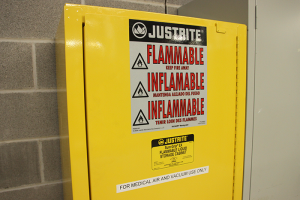Hackensack takes fight for safer chemical regulations to Congress
Hackensack University Medical Center (HackensackUMC), Bergen County, N.J., is working with the American Sustainable Business Council (ASBC), Washington, D.C., to push the federal government to establish stronger regulations on the use of chemicals in health care and other products.
By joining ASBC last June, Hackensack now has an advocate for the medical center’s Safer Chemicals policy and mission to rid all products and devices in health care of unsafe chemicals, says Kyle Tafuri, senior sustainability adviser,the Deirdre Imus Environmental Health Center, part of HackensackUMC.
Hackensack supports the following principles as essential for an effective Safer Chemicals policy:
- Ensuring that chemical manufacturers demonstrate the safety of their products.
- Taking immediate action on the most toxic chemicals.
- Requiring chemical manufacturers to provide full information on the health and environmental hazards associated with how they are being used, and the ways that the public or workers may be exposed.
Overwhelming scientific evidence shows that some of the 80,000 chemicals on the market today can be linked to chronic diseases, including certain types of cancer, Alzheimer’s, Parkinson’s and others, but only five have been regulated, according to ASBC.
“We feel that meaningful reform of the Toxic Substances Control Act is necessary to help us better understand the chemicals in commerce today and lead us to greener, safer chemistry,” the ASBC states. “Comprehensive chemical policy change must happen in order for us to truly begin creating healthier communities.
ASBC is a national alliance that represents more than 200,000 businesses and 325,000 entrepreneurs, executives, managers and investors from a range of industries on sustainability issues.
Even with ASBC’s help, Hackensack is finding that convincing Congress to enact tough legislation regulating the use of chemicals is a very tough mission, Tafuri says.
“In terms of policy, we haven’t seen concrete change yet but, obviously, any policy change in today’s political climate takes a long time,” Tafuri says.
Even so, ASBC gives Hackensack a voice in Congress on the safer chemicals issue from a health care perspective that it did not have before, he says. Hackensack and ASBC both have met with members of Congress to discuss the issue where they’ve received a mixed response to the cause, he says.
Regardless, Hackensack is in the battle for the long haul. “We need an effective policy ensuring that when these products come out on the market, their safety is demonstrated,” he says.
Hackensack was among the first hospitals in the country to put a policy in effect that it would no longer purchase upholstered furniture with flame retardants, Tafuri says.
Hackensack also signed onto the Healthy Interiors Challenge sponsored by the Healthier Hospitals Initiative to commit, when possible, to buying furniture and furnishings that did not contain five chemicals, including flame retardants, he says.
The hospital is working to eliminate diethylhexyl-phthalate (DEHP), a substance used mainly as an additive in plastics to make them more flexible, from products in its neonatal intensive care unit, he says. The chemical is linked to adverse health effects.
Hackensack’s sustainability mission began more than a decade ago when it launched the Deirdre Imus Environmental Health Center. The health center is one of the first U.S. hospital-based programs whose mission and educational programs are meant to identify, control and ultimately prevent children and the general public from being exposed to toxic chemicals in the environment.
In 2001, HackensackUMC became one of the first hospitals in the country to implement green cleaning practices through its Greening The Cleaning program. The program strives to eliminate all cleaning agents containing hazardous ingredients and replace them with environmentally responsible, less-toxic products
HackensackUMC has earned a long list of awards and accolades for its work in sustainability through the years. It received Practice Greenhealth’s highest honor as a 2015 Environmental Excellence Award winner, earning recognition once again as one of the top 25 green hospitals in the country.
Practice Greenhealth also honored Hackensack for outstanding performance in a range of sustainability initiatives.




